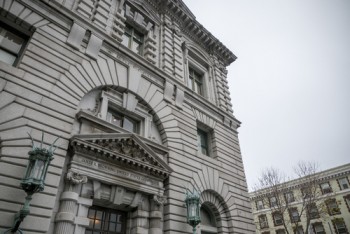9th Circuit dissenters take aim at state-created danger doctrine

A panel of the 9th U.S. Circuit Court of Appeals at San Francisco in March allowed Jose Murguia to use the state-created danger doctrine in a lawsuit filed on behalf of himself and the estates of his twins. The children were drowned by their mother. Photo from Shutterstock.
The 9th U.S. Circuit Court of Appeals at San Francisco should narrow the state-created danger doctrine, according to four judges who dissented when the appeals court refused to grant an en banc rehearing in a lawsuit over a mother’s drowning of her 10-month-old twins.
Law.com has a story on the July 18 dissent and the doctrine, which allows constitutional claims for damages against state actors who place plaintiffs in danger of injury through their affirmative acts.
John Culhane, a professor at the Widener University Delaware Law School, told Law.com that federal appeals courts are “all over the place” in how they apply the state-created danger doctrine. He said it’s possible that the U.S. Supreme Court will eventually revisit the issue.
“Whatever you think of the doctrine—whether it should exist or not, and if so, in what form—it does seem to make sense to have a clearer idea of what it actually is,” said Culhane, who nonetheless thinks that it would be a “terrible mistake” to do away with the doctrine completely.
A 9th Circuit panel in a March opinion allowed Jose Murguia to use the doctrine in a suit filed on behalf of himself and the estates of his twins. The children were drowned by their mother after they were transported to a motel by a Tulare, California, police sergeant and other officers while she was suffering a mental health crisis.
The 9th Circuit panel allowed Murguia’s claims against the sergeant and a social worker that were based on the doctrine.
The 9th Circuit denied a rehearing en banc July 18, leading to the dissent by Judge Patrick J. Bumatay, an appointee of former President Donald Trump. His opinion was joined by Judges Consuelo M. Callahan, Sandra S. Ikuta and Ryan D. Nelson.
Bumatay said the 9th Circuit and most other circuit courts have recognized the state-created danger doctrine as a substantive due process right under the 14th Amendment’s due process clause. The doctrine creates an exception to the general rule that the due process clause doesn’t obligate the state to protect its citizens from harm caused by private actors.
But Bumatay said the doctrine “finds no support in the text of the Constitution, the historical understanding of the ‘due process of law’ or even Supreme Court precedent.”
The circuits that recognize the state-created danger doctrine based their reasoning on just two sentences of the Supreme Court’s 1989 decision DeShaney v. Winnebago County Department of Social Services, Bumatay said.
In DeShaney, the Supreme Court rejected a suit against Wisconsin social workers for failing to protect 4-year-old Joshua DeShaney from his father after reports of abuse. The child suffered permanent brain damage after a severe beating. The Supreme Court said the state may have been aware of the dangers that Joshua faced, but “it played no part in their creation, nor did it do anything to render him more vulnerable to them.”
Since then, courts have interpreted the decision to allow a suit for a constitutional violation if a state actor created the danger that led to the injury. And courts have broadened the reach of the doctrine over time, Bumatay said.
“Now, commonplace actions—like providing a ride, booking a motel room or telling a lie—when done by a state actor, could become due process violations if the actions eventually lead to injuries caused by third parties,” he said.
Bumatay argued that if a state-created danger doctrine is recognized, it should allow suits only when the government places a person in harm’s way after taking steps to restrain that person’s liberty.
Bumatay noted that the 5th Circuit at New Orleans has not adopted the doctrine, citing a March decision by that court, Fisher v. Moore. In that decision, the 5th Circuit held that qualified immunity protected school officials who failed to protect a student from two sexual assaults by another student with known violent tendencies.
According to the Volokh Conspiracy, the appeals court said in Fisher the 5th Circuit has never adopted a state-created danger exception, so the plaintiff could not claim that there was no immunity because of a clearly established right. The decision declined to adopt the doctrine, “given the Supreme Court’s recent forceful pronouncements signaling unease with implied rights not deeply rooted in our nation’s history and tradition.”
Bumatay agreed with the 5th Circuit’s assessment of the Supreme Court’s recent jurisprudence. He cited the Supreme Court’s June 2022 decision overturning the right to abortion, Dobbs v. Jackson Women’s Health Organization, saying it embraced the idea that courts should be reluctant to recognize rights not mentioned in the Constitution.
The 9th Circuit decision is Murguia v. Langdon.



